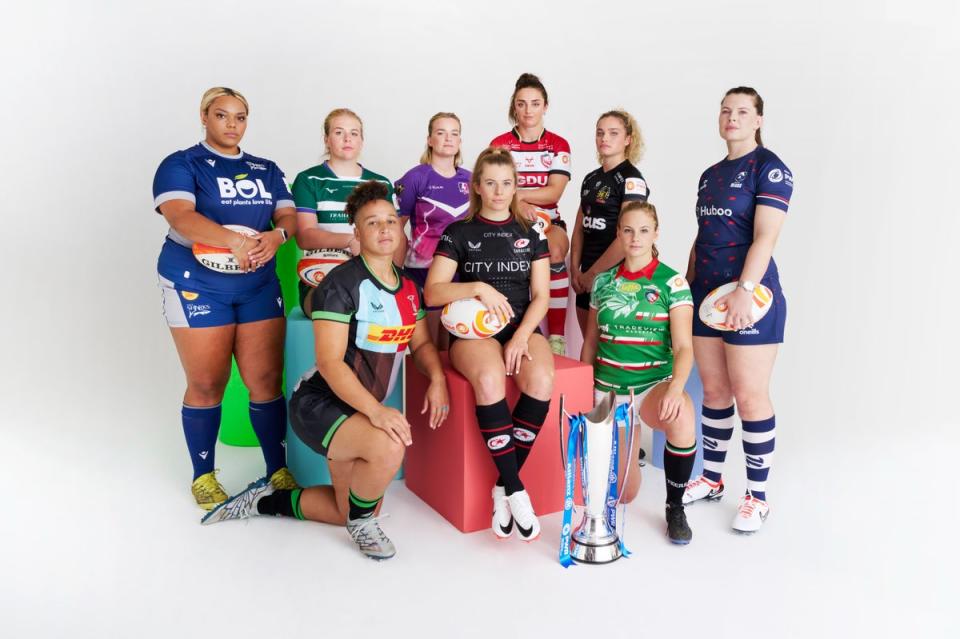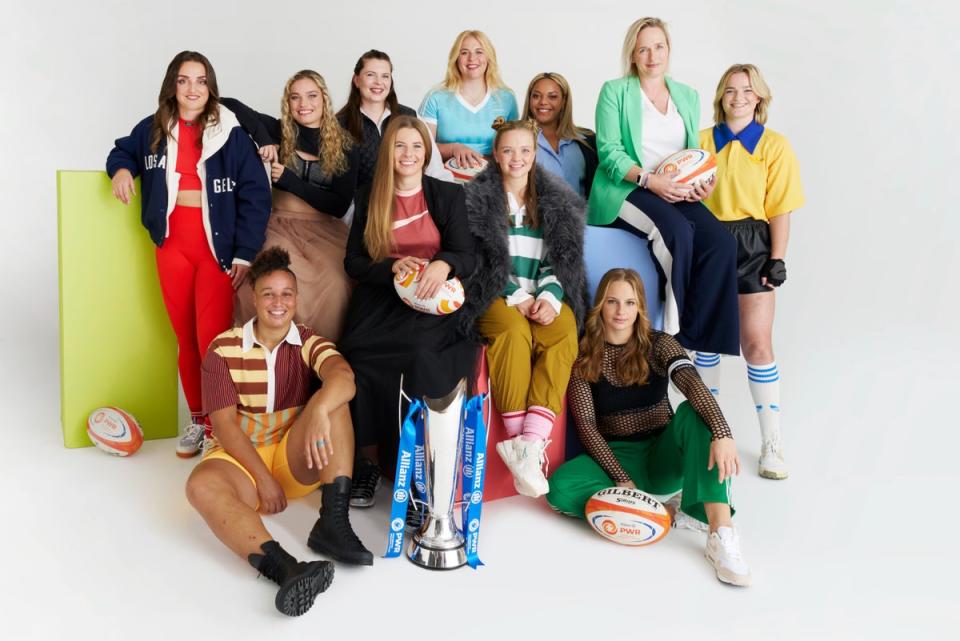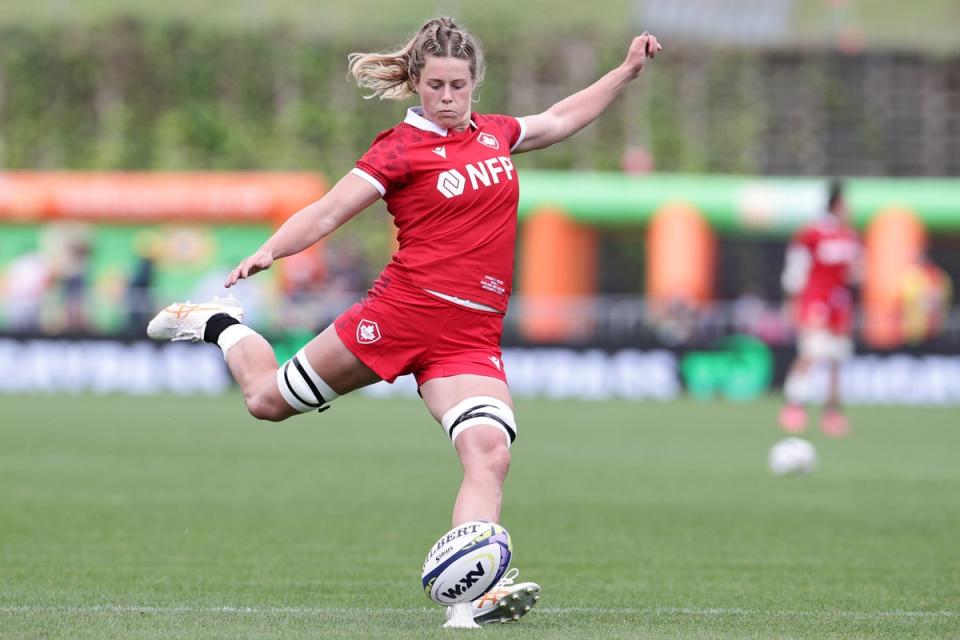
It felt like an appropriate location for the launch of a new era of domestic women’s rugby. On Wednesday evening, the great and the good of English rugby crowded into a room around the corner from Battersea Power Station, celebrating the rebirth of Premiership Women’s Rugby (PWR), the retitled, reinvigorated top division of English domestic women’s rugby and the next step in the sport’s evolution.
Syntax lovers look away, but the league’s new initials are, obviously, no coincidence. Formerly known as Premier 15s, this rebrand was born out of a desire to strengthen the footprint of the competition and progress towards financial sustainability under the leadership of a new limited company headed by Belinda Moore.
“What we are seeing now is a really exciting growth in the interest in women’s rugby,” Moore told The Independent earlier this year. “You saw that in some of the TV viewing figures around the World Cup final, the day at Twickenham during the Six Nations. You can start to see the growth coming.
“It’s almost like being on the edge of a springboard and waiting to dive into this huge opportunity that waits ahead of us. It is about making sure that we absolutely capitalise upon it for the good of the sport. I can’t wait.”
A flagship launch campaign – “Powered Differently” – has seen a selection of players photographed in innovative dress designed to showcase their personalities and show a different side of the sport. A landmark TV deal has been agreed with TNT Sports, a broadly positive step even if the financial details are undisclosed and a move away from a free-to-air agreement with BBC iPlayer is not ideal.

On the pitch, though, the English top flight is already established as the optimal place for the world’s best women’s rugby players to play. While much is made of the Red Roses’ progress within the professional structures that the Rugby Football Union (RFU) has put around them, it is the competitive nature of the league which they call home for most of the year that has really driven the English side on.
Another handful of global superstars have joined the league’s ranks this season. Sophie de Goede – the goal-kicking No 8 and all-action captain of Canada – has returned to Saracens to add another world-class back-row option to Alex Austerberry’s squad as the Premier 15s queens bid to take back their throne after a semi-final exit last season.
Imaginative Italian playmaker Beatrice Rigoni has signed for Sale, who have also added breakthrough England youngster Morwenna Talling, while ambitious Trailfinders Women have invested heavily – USA skipper Kate Zackary and England flyer Abby Dow should thrive under the tutelage of Giselle Mather.
Leicester Tigers are new additions, too, one of the big beasts of the men’s game ready to roar in their first season in the top tier of women’s rugby. Defending champions Gloucester-Hartpury, beaten finalists Exeter Chiefs, Harlequins and Bristol Bears all appear in fine fettle, too – there will be no easy games.

“I think it is really exciting for the league as a whole,” said Marlie Packer, World Rugby’s Player of the Year, this week ahead of Saracens’ opener against Loughborough Lightning. “We want to be tested week in, week out. It’s not just about rocking up and playing, you need to put in an 80-minute performance. You can’t knock off. I’m really looking forward to what Trailfinders Women and Leicester Tigers are going to bring.
“It’s so exciting to play in it. I think it is the best league in the world, you see that from players from other nations who want to come and play in our league and keep pushing. Having TNT on board showing our games is phenomenal. We need to keep getting on TV as much as possible – the more you see it, you can believe and want to do it. It’s about inspiring future rugby players, boys and girls, to enjoy the game that has given me so much.”
Not all is well. This new season was meant to launch with 10 teams, but already Warriors Women have been lost, the continuing fallout from the collapse of Worcester last year having significant ramifications. The women’s operation at Sixways had been taken over by local company Cube International but their sudden withdrawal just weeks before the new season has highlighted the financial realities on the pathway towards professionalisation.
“The support just doesn’t exist for it,” Andy Moss, Cube’s chairman, told the BBC, citing a figure of £1m a season to run the club. “Quite simply, it wasn’t financially viable. The men’s teams are generating anywhere between 6,000 and 20,000 people watching a game – all buying a ticket and supporting the club and generating revenue. We’ve got no one coming to watch [the women], no commercial interest – it’s not a viable proposition at this moment.”

Club coaches have also expressed concern that the international calendar will impinge on the league. England and Wales players who featured in WXV1 have been back with their clubs for just a couple of training sessions. While the league is no longer under the control of the Rugby Football Union (RFU), those with Red Roses central contracts are still closely managed, sometimes held out of club games in which they want to play to preserve their energy for England camps and fixtures down the line.
Yet there is no doubt a sense of optimism on season’s eve. There are continuing negotiations over a possible free-to-air broadcast partner and additional sponsors. The product on the pitch is already strong and there are promising signs off it, too, for a revamp that could power up the women’s game.
Article courtesy of
Source link